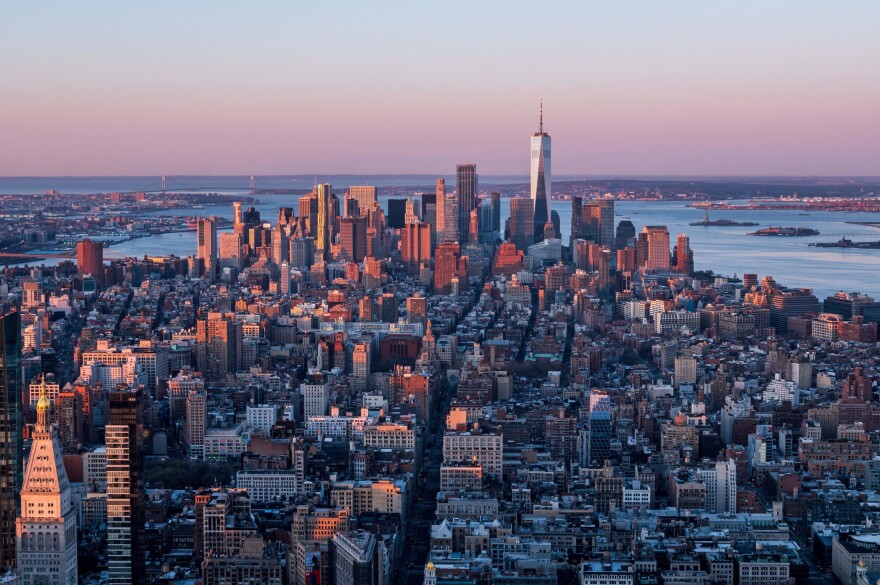When the pandemic first began, many landlords in places like New York City offered prospective renters perks, such as waiving broker fees or free rent for a month.
Those deals are long over, and many parts of the country are seeing double-digit jumps in rental prices. In New York City, rents have increased on average by 30% in the past year.
Democratic State Sen. Julia Salazar, who represents Brooklyn, says people are calling her office saying landlords are raising their rent by hundreds of dollars more per month.
“People contact us because they assume that this is illegal, but the truth is, it’s not,” Salazar says. “Right now in New York state, if you are an unregulated tenant, there is virtually no protection under the law … from the landlord raising your rent by any amount or evicting you without having to show any cause whatsoever.”
This week, the Furman Center at New York University, which researches housing, released a study that looked at the situation in New York. Executive Director Matt Murphy says the research shows the country has been in a housing emergency for the last 50 years — and it keeps getting worse.
“For a long time if you go back to the ‘70s, we had a much lower rate of rent burden, it was closer to 25%,” Murphy says. “And now we are closer to 50%. So if you look at the very long-term trend, our rents have grown at a higher pace than income. Supply has not kept pace.”
Rental inventory in New York City was down 26% this April compared to the same time in 2021, according to the New York real estate website StreetEasy.
Evictions are also climbing again. Salazar says she has constituents who are fearful that they will not only be priced out of their rentals but left with little options on where to go next.
“I was speaking to someone who lives in Bushwick. It’s not the most expensive neighborhood in New York City, and she’s someone who earns a pretty competitive salary,” Salazar says. “But she is looking at a rent increase of 27%, which is like $875, she said. That’s impossible.”
Salazar tried during the legislative session to provide a buffer for tenants through the Good Cause Eviction bill, which among other things would have prevented evictions if a landlord raises rents beyond 3%. But Salazar couldn’t get enough traction, and it never made it to a vote.
Real estate brokers like Rachel Richards, who goes by Red, are seeing these price hikes on the ground in real time. She’s with the firm Brown Harris Stevens in New York, and she says the renters getting squeezed the most are those looking for apartments under $3,500 a month.
“You want as many people to get a good deal as possible and not just sellers to make tons of money and not just buyers to get something way under the market,” Richards says. “You want it to feel kind of balanced.”
The current market is even impacting rent-stabilized apartments, which make up about half of rentals in New York City. The New York City Rent Guidelines Board, which controls rent-stabilized apartments, recently voted in favor of a proposed 2 to 6% increase for those apartments — setting the stage for what could be one of the biggest rental increases in a decade. The board will conduct a final vote on rent increases later this month.
While she sympathizes with renters struggling to find an affordable place, Christina Smyth, who represents landlords on the Rent Guidelines Board, says landlords are hurting too. Upgrades and repairs, she says, are harder than ever to implement without upping rent.
“The cost of doors, the cost of windows, all of those costs are increasing by the moment,” Smyth says. “Plumbers, their costs, their cost of raw materials are up, so that goes to the landlord.”
Smyth argues that rent freezes and eviction moratoriums have actually destabilized the market, making everyone suffer.
“It has to be left to a market, and the landlord and the tenant decide in a free market system what the rent is,” she says. “If they can’t afford it, they have to find a different apartment. And hopefully, if one landlord is charging [$4,000] and another landlord is charging [$6,000], who’s going to get the tenant?”
Murphy with the Furman Center says there’s no clear villain here. Both landlords and tenants are facing challenges out of their control.
“You can point the finger in a lot of directions,” he says. “You can point it at government agencies who don’t do enough. You can point it at landlords who have turned over buildings and created kind of a villainous persona, and then you could also point it at saying our rent laws are far too restrictive, and how could the market work in this environment?”
All of this makes it hard to find a simple solution. Murphy says this situation is a new baseline, much like what happened in 2009 after the 2008 housing crisis. He sees the same future post-pandemic.
“The city is in for some sort of new normal,” Murphy says. “We are now in 2022, and we just faced a tremendous shock and stress that we’re grappling with.”
This article was originally published on WBUR.org.
Copyright 2022 NPR. To see more, visit https://www.npr.org.



